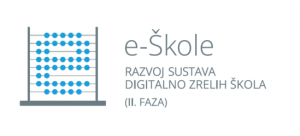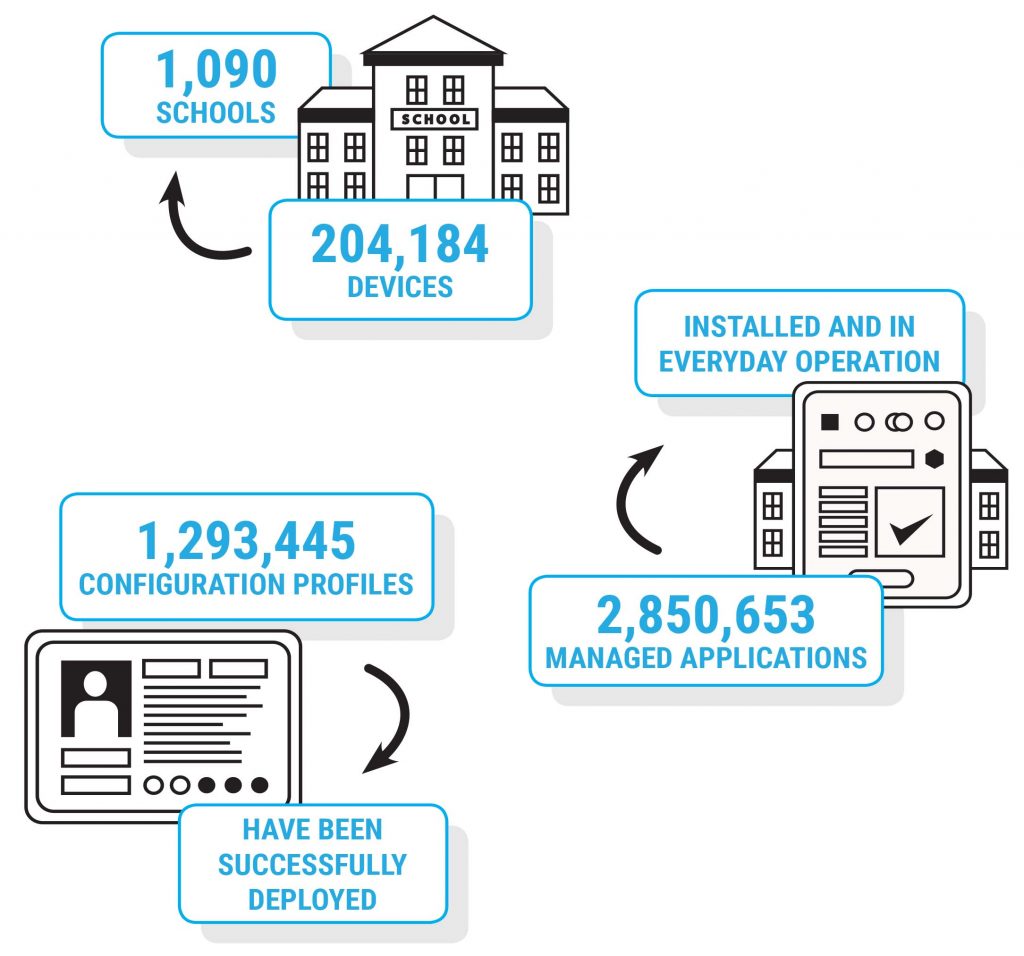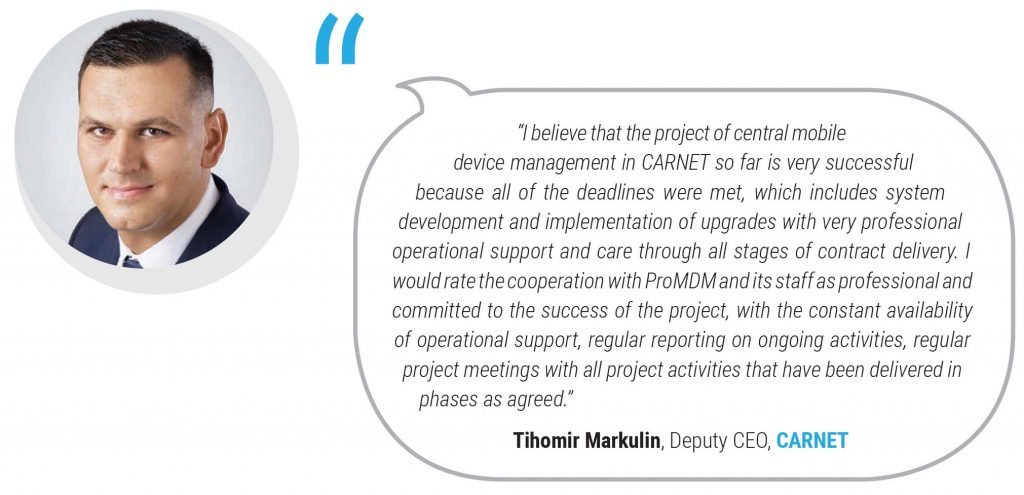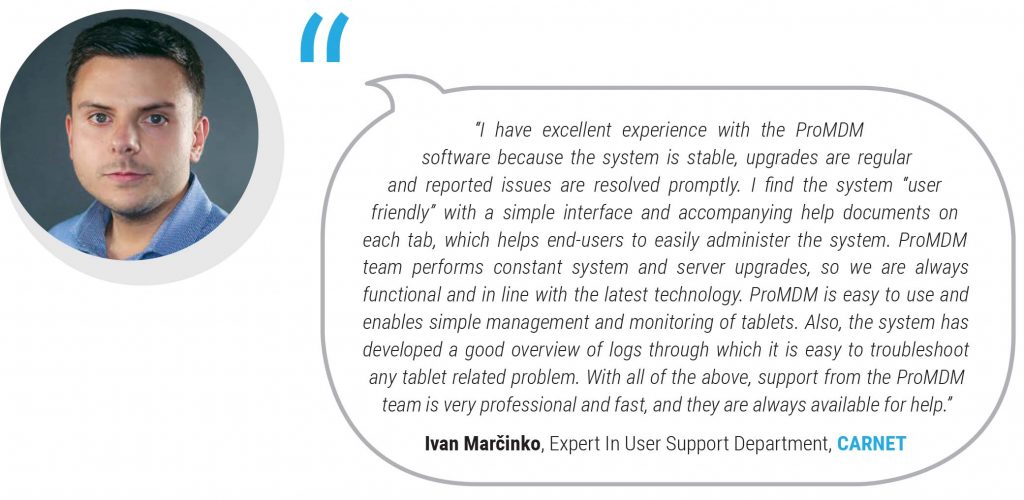
MOBILE DEVICES OF CROATIAN NATIONAL EDUCATION SYSTEM, CENTRALLY MONITORED AND MANAGED


MOBILE DEVICES OF CROATIAN NATIONAL EDUCATION SYSTEM, CENTRALLY MONITORED AND MANAGED


MOBILE DEVICES OF CROATIAN NATIONAL EDUCATION SYSTEM, CENTRALLY MONITORED AND MANAGED


MOBILE DEVICES OF CROATIAN NATIONAL EDUCATION SYSTEM, CENTRALLY MONITORED AND MANAGED


MOBILE DEVICES OF CROATIAN NATIONAL EDUCATION SYSTEM, CENTRALLY MONITORED AND MANAGED

RESULTS


As a result, today, 204,184 devices are up and running smoothly within 1,090 schools!
- 2,850,653 managed applications needed for schooling were installed and in use in everyday operation on students’ tablets.
- 1,293,445 configuration profiles have been successfully deployed to tablet devices, ensuring all required tablet related policies have been applied.
- Every school is a separate organization in the system and has a local admin that can address all of its specific needs and challenges.
The system is centralized and can be regularly monitored, which provides continuous insight and reporting about state of devices, policy implementation, device management and health status, which ensures smooth and efficient usage of the tables in teaching process, but also contributes to reducing security and privacy related risks.
ProMDM product was modified for specific CARNET needs, so today it surpasses its role as purely mobile device management software and has become in a large way a specialized solution that manages and supervises all “e-school” mobile devices that are meant to be used by students and teachers.
ProMDM is helping Croatian national school system to be safe, secured and centrally monitored and managed.

About CARNET
Croatian Academic and Research Network – CARNET is a public institution operating within the Ministry of Science and Education in the field of information and communication technology and its application in education.
CARNET was established to innovate the education system and encourage the progress of society as a whole, through ICT (information and communication technology).
CARNET services are available to primary and secondary schools, institutions from the science and higher education institutions, as well as to numerous public institutions such as certain ministries, hospitals, etc. - 4,130 locations across Croatia are connected to the CARNET network.
Following the latest trends in ICT, infrastructure and education over the years, CARNET devised many projects and developed new services. Currently, they provide more than 70 services, from education and training to multimedia, computer security and customer support.
CARNET’s main aim is to build a digitally mature society with a focus on the implementation of the “e-Schools” project in primary and secondary education.



Business GOALS
The main goal of the e-Schools project is to contribute to empowerment of the primary and secondary education system capabilities while enabling students to become active participants of the labor market, pursue further education and engage in life-long learning.
Digitalization of business and teaching processes imposes the necessity of harmonized implementation of both infrastructural and service-educational parts of the project, with the awareness that the basis of education is the teacher, and the primary focus is the student.
Implementation of the e-Schools project represents a main pillar of the long-term strategic vision of education. It includes the development of curricula, digital content, new digital ways of learning and teaching, as well as professional development of teachers, school staff and students with the use of information and communication technologies.
Main GOALS of the second phase of the e-Schools project:
Digitalization of teaching processes
- refers to all forms of application of information and communication technologies and digital content in teaching.
Digitalization of business processes in schools
- a process that ensures the business transparency and general availability of data, as well as their unification, faster and safer business, and in general, more efficient business management in schools.
Business CHALLENGES
When an extensive task of being responsible for digitalizing the entire national school system arose in front of CARNET, they wanted to do this job with reliable partners. One of the important parts of the e-Schools project was acquisition of a massive quantity of tablet devices for teachers and school children.
Very soon questions emerged: how will such large number of devices be implemented, monitored, managed and secured?
More than 200,000 tablet devices were distributed, in over 1,000 schools across the entire country, which required a robust and reliable centralized device management system.
There were several main challenges that needed to be addressed immediately:
- Efficient initial distribution of a massive number of tablet devices to students across the entire country
- Unified tablet configuration with the application of all necessary policies – preparation for use in teaching
- Importance of installation of all requested school apps on all devices simultaneously
- Children’s safety & privacy needed to be guaranteed
- Integration with existing infrastructure and services was crucial (e.g. usage of nationwide AAI directory system)
- Centralized and standardized management and control of all devices was needed, with flexibility and “empowerment” at the local level
- Reporting and monitoring of deployment process and usage of tablets needed to be implemented.
A Mobile Device Management (MDM) solution was necessary!
One solution which could control all the devices at the same time and handle specific requirements such as:
- Enrollment of a very large number of devices simultaneously and easy, simple and fast assignment of devices to individual students
- Implementing configuration profiles that ensure enforcement of specific policies related to the usage of mobile devices in schools (i.e. enforcing password protection for security, automatic configuration of school Wi-Fi networks, safe internet usage etc.)
- Controlled mobile application and content distribution via MDM system – only preapproved apps and content for a sensitive audience like young children
- Protection of devices via remote device lock and wipe
- Use and management of digital certificates for secure access to data and services
- Easy and simple integration with existing IT environment and systems
- Defining multiple local organizations (one for each school) and a global (central) one, since this project requested complex heterogeneous structure
- Reporting – regular reports on device usage and state.

SOLUTION
CARNET started with research and education on how to manage and control mobile devices several years before the e-Schools project began. They tried and tested different MDM systems to address all possible challenges and specifics of their business, comparing features of different software solutions and unique needs of managing devices for school children.
A year before the main project started, CARNET conducted a pilot project and tested the deployment of over 8,000 devices in 100 schools across the country. Based on their previous experience, they selected ProMDM mobile device management software for this pilot. After finding the software more than satisfying during the pilot, they proceeded with a massive enrollment of mobile devices into the ProMDM system.
There were a lot of product modifications involved for the project to be successful. ProMDM product needed to fit the specific requirements of the national e-Schools project.
Some of the challenges that were addressed are:
- Centralized management of large number of tablets in schools, with the implementation of restriction policies that protect students’ rights.
- Global deployment of applications within the system, which can then be used by all administrators in all primary schools in the Republic of Croatia.
- Possibility of different distinctive types of device enrollment:
- Bulk anonymous device enrollment allows enrollment of large number of devices. This type of enrollment is used in a large-scale entry of devices into the system. Using a QR code, the device enters a specific organization/school and is later assigned to its owner/user.
- Zero touch enrollment – with this type of enrollment, the device is connected with the ProMDM system from the very start. The user just needs to unpack the device and turn it on, and the device is ready for enrollment. With this, both security and efficiency are significantly increased.
- Device labelling - when entering the ProMDM system, the device receives a unique label (that each school can customize). By sending a command, the label can also be displayed on the device’s lock screen. This makes it easier to physically identify a device even if it is locked.
- Creating a heterogeneous structure and hierarchy for organizations:
- Fully automated provisioning of new organizations (schools) that is initiated by the first login of organization administrator or user to ProMDM system.
- A global centralized organization that serves as a template organization for local organizations (specific schools).
- Enabled standardized management of devices across all organizations.
- Every school with its organization and its administrators has the right to administer and add content locally.
- ProMDM system allows devices to be grouped by attributes for more efficient management:
- Groups can easily be formed by tagging all devices that should be grouped. For example, all devices belonging to students that attend a certain class can be put into a single group, all faculty staff devices can be grouped etc.
- Groups can also be created dynamically based on the features of the device itself (according to the apps installed on it, battery status, applied configuration settings or profiles, etc.), which can greatly facilitate device management.
- Usage of groups also enables easy application and distribution of important applications or restrictions on all tablets within the system through automation processes.
- ProMDM system is localized in the local language. It also offers a bilingual user interface and help documents, both in Croatian and English language

RESULTS


As a result, today, 204,184 devices are up and running smoothly within 1,090 schools!
- 2,850,653 managed applications needed for schooling were installed and in use in everyday operation on students’ tablets.
- 1,293,445 configuration profiles have been successfully deployed to tablet devices, ensuring all required tablet related policies have been applied.
- Every school is a separate organization in the system and has a local admin that can address all of its specific needs and challenges.
The system is centralized and can be regularly monitored, which provides continuous insight and reporting about state of devices, policy implementation, device management and health status, which ensures smooth and efficient usage of the tables in teaching process, but also contributes to reducing security and privacy related risks.
ProMDM product was modified for specific CARNET needs, so today it surpasses its role as purely mobile device management software and has become in a large way a specialized solution that manages and supervises all “e-school” mobile devices that are meant to be used by students and teachers.
ProMDM is helping Croatian national school system to be safe, secured and centrally monitored and managed.

About CARNET
Croatian Academic and Research Network – CARNET is a public institution operating within the Ministry of Science and Education in the field of information and communication technology and its application in education.
CARNET was established to innovate the education system and encourage the progress of society as a whole, through ICT (information and communication technology).
CARNET services are available to primary and secondary schools, institutions from the science and higher education institutions, as well as to numerous public institutions such as certain ministries, hospitals, etc. - 4,130 locations across Croatia are connected to the CARNET network.
Following the latest trends in ICT, infrastructure and education over the years, CARNET devised many projects and developed new services. Currently, they provide more than 70 services, from education and training to multimedia, computer security and customer support.
CARNET’s main aim is to build a digitally mature society with a focus on the implementation of the “e-Schools” project in primary and secondary education.



Business GOALS
The main goal of the e-Schools project is to contribute to empowerment of the primary and secondary education system capabilities while enabling students to become active participants of the labor market, pursue further education and engage in life-long learning.
Digitalization of business and teaching processes imposes the necessity of harmonized implementation of both infrastructural and service-educational parts of the project, with the awareness that the basis of education is the teacher, and the primary focus is the student.
Implementation of the e-Schools project represents a main pillar of the long-term strategic vision of education. It includes the development of curricula, digital content, new digital ways of learning and teaching, as well as professional development of teachers, school staff and students with the use of information and communication technologies.
Main GOALS of the second phase of the e-Schools project:
Digitalization of teaching processes
- refers to all forms of application of information and communication technologies and digital content in teaching.
Digitalization of business processes in schools
- a process that ensures the business transparency and general availability of data, as well as their unification, faster and safer business, and in general, more efficient business management in schools.
Business CHALLENGES
When an extensive task of being responsible for digitalizing the entire national school system arose in front of CARNET, they wanted to do this job with reliable partners. One of the important parts of the e-Schools project was acquisition of a massive quantity of tablet devices for teachers and school children.
Very soon questions emerged: how will such large number of devices be implemented, monitored, managed and secured?
More than 200,000 tablet devices were distributed, in over 1,000 schools across the entire country, which required a robust and reliable centralized device management system.
There were several main challenges that needed to be addressed immediately:
- Efficient initial distribution of a massive number of tablet devices to students across the entire country
- Unified tablet configuration with the application of all necessary policies – preparation for use in teaching
- Importance of installation of all requested school apps on all devices simultaneously
- Children’s safety & privacy needed to be guaranteed
- Integration with existing infrastructure and services was crucial (e.g. usage of nationwide AAI directory system)
- Centralized and standardized management and control of all devices was needed, with flexibility and “empowerment” at the local level
- Reporting and monitoring of deployment process and usage of tablets needed to be implemented.
A Mobile Device Management (MDM) solution was necessary!
One solution which could control all the devices at the same time and handle specific requirements such as:
- Enrollment of a very large number of devices simultaneously and easy, simple and fast assignment of devices to individual students
- Implementing configuration profiles that ensure enforcement of specific policies related to the usage of mobile devices in schools (i.e. enforcing password protection for security, automatic configuration of school Wi-Fi networks, safe internet usage etc.)
- Controlled mobile application and content distribution via MDM system – only preapproved apps and content for a sensitive audience like young children
- Protection of devices via remote device lock and wipe
- Use and management of digital certificates for secure access to data and services
- Easy and simple integration with existing IT environment and systems
- Defining multiple local organizations (one for each school) and a global (central) one, since this project requested complex heterogeneous structure
- Reporting – regular reports on device usage and state.

SOLUTION
CARNET started with research and education on how to manage and control mobile devices several years before the e-Schools project began. They tried and tested different MDM systems to address all possible challenges and specifics of their business, comparing features of different software solutions and unique needs of managing devices for school children.
A year before the main project started, CARNET conducted a pilot project and tested the deployment of over 8,000 devices in 100 schools across the country. Based on their previous experience, they selected ProMDM mobile device management software for this pilot. After finding the software more than satisfying during the pilot, they proceeded with a massive enrollment of mobile devices into the ProMDM system.
There were a lot of product modifications involved for the project to be successful. ProMDM product needed to fit the specific requirements of the national e-Schools project.
Some of the challenges that were addressed are:
- Centralized management of large number of tablets in schools, with the implementation of restriction policies that protect students’ rights.
- Global deployment of applications within the system, which can then be used by all administrators in all primary schools in the Republic of Croatia.
- Possibility of different distinctive types of device enrollment:
- Bulk anonymous device enrollment allows enrollment of large number of devices. This type of enrollment is used in a large-scale entry of devices into the system. Using a QR code, the device enters a specific organization/school and is later assigned to its owner/user.
- Zero touch enrollment – with this type of enrollment, the device is connected with the ProMDM system from the very start. The user just needs to unpack the device and turn it on, and the device is ready for enrollment. With this, both security and efficiency are significantly increased.
- Device labelling - when entering the ProMDM system, the device receives a unique label (that each school can customize). By sending a command, the label can also be displayed on the device’s lock screen. This makes it easier to physically identify a device even if it is locked.
- Creating a heterogeneous structure and hierarchy for organizations:
- Fully automated provisioning of new organizations (schools) that is initiated by the first login of organization administrator or user to ProMDM system.
- A global centralized organization that serves as a template organization for local organizations (specific schools).
- Enabled standardized management of devices across all organizations.
- Every school with its organization and its administrators has the right to administer and add content locally.
- ProMDM system allows devices to be grouped by attributes for more efficient management:
- Groups can easily be formed by tagging all devices that should be grouped. For example, all devices belonging to students that attend a certain class can be put into a single group, all faculty staff devices can be grouped etc.
- Groups can also be created dynamically based on the features of the device itself (according to the apps installed on it, battery status, applied configuration settings or profiles, etc.), which can greatly facilitate device management.
- Usage of groups also enables easy application and distribution of important applications or restrictions on all tablets within the system through automation processes.
- ProMDM system is localized in the local language. It also offers a bilingual user interface and help documents, both in Croatian and English language

